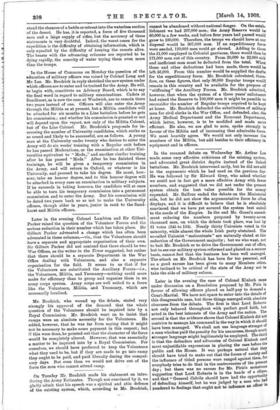On Tuesday Mr. Brodrick made his statement on intro- ducing
the Army Estimates. Though not convinced by it, we gladly admit that his speech was a spirited and able defence of the existing system, which, according to Mr. Brodrick,
cannot be abandoned without national danger. On the estab. lishment we had 207,000 men; the Army Reserve would be 60,000 in a few weeks, and before four years had passed would grow to 100,000. Therefore, the troops we should have at our disposal would be 307,000 men. If an expeditionary force were needed, 120,000 men could go abroad. Adding to these the 51,000 employed in Colonial garrisons, there would then be 171,000 men out of this country. From 20,000 to 22,000 sick and inefficient men must be deducted from the total. When these and other deductions had been made, there would be left 56,000. From this number would be supplied the drafts for the expeditionary force. Mr. Brodrick calculated, there- fore, on these figures, that only 36,000 Regular troops wotrld remain in this country and be available for the purpose of " stiffening " the Auxiliary Forces. Mr. Brodrick admitted, however, that when the system of a three years' enlistment had raised the Reserve to 100,000 men it might be possible to reconsider the number of Regular troops required to be kept at home. Mr. Brodrick defended the substitution of military men for civil clerks in the War Office, and defended, also, the Army Medical Department and the Remount Department, which latter, however, is to be modified and made more efficient. He also, we are glad to note, spoke strongly in favour of the Militia and of increasing that admirable force. We most heartily agree. We would not only increase the numbers of the Militia, but add besides to their efficiency in equipment and in officers.










































 Previous page
Previous page